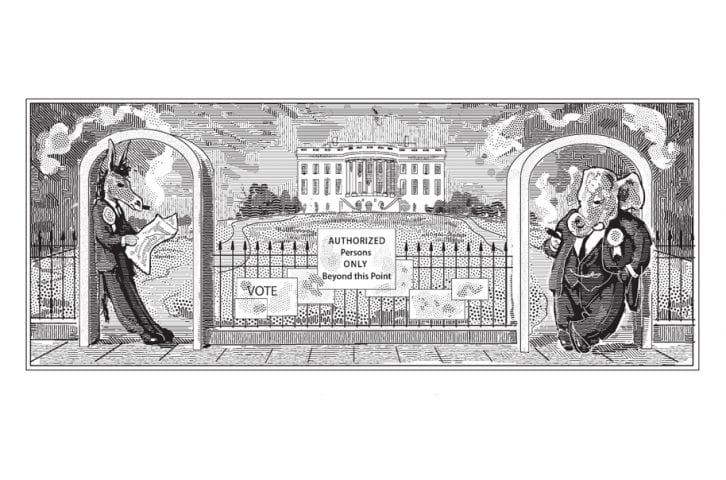Books Reviewed
A review of Willful Blindness: A Memoir of the Jihad , by Andrew C. McCarthy
, by Andrew C. McCarthy
September 11, 2001, will live in infamy, but February 26, 1993, should also cause Americans to shudder. On that day 15 years ago, Islamic militants tried to topple the World Trade Center; six people in the building were killed, over a thousand injured. It was the first time the world network of Islamic terrorists had struck on American soil. Most Americans missed the message.
Andrew McCarthy's Willful Blindness: A Memoir of the Jihad is a comprehensive, meticulous, and impassioned reminder of that message. As lead prosecutor in one of the most notorious terrorism cases in U.S. history, no one is better equipped than McCarthy to recount the details of the ensuing trial that condemned Islamist kingpin Omar Abdel Rahman to a lifetime in a supermax prison. Equal parts historian, storyteller, and prophet, McCarthy relates the case's background magnificently. He begins with a penetrating history of the jihad movement: its origins in the Afghan-Soviet war, the CIA's involvement in fostering an environment that in turn spawned al-Qaeda and other jihadist groups, and the policy failures and institutional incompetence of our government, which eventually allowed a terrorist cell led by Rahman, the Egyptian "blind sheik," to conduct the recruitment, planning, and training for a major attack right here on our shores.
More than shadowy plotting occured within our borders. McCarthy recalls a 1998 speech by Osama bin Laden's mentor Abdullah Azzam, delivered not in Pakistan, but in Oklahoma City, where a crowd of American-based Muslims was instructed that "the jihad, the fighting, is obligatory on you whenever you can perform it. And just as when you are in America you must fast…so, too, must you wage jihad. The word jihad means fighting only, fighting with the sword." It was a conference in the same city, on Christmas Day, 1992, sponsored by the Muslim American Youth Association (MAYA), that sparked my own interest in tracking radical Islam. The conclave featured speakers like Khaled Meshaal, Hamas's supreme leader. Speeches were punctuated by frenzied shouts of "kill the Jews" and "destroy the West." Books like How to Kill the Infidel were sold.
These events exposed a violent domestic strain of Islam whose menace was completely underestimated by federal authorities at the time-and, unfortunately, all too often still. Willful Blindness levels a stinging critique not only of the self-defeating relationship between America's intelligence and law enforcement agencies, but of our inability to rethink a counterterrorism policy that relied on the legal system rather than on more aggressive and effective military techniques. "In the war against radical Islam," writes McCarthy, "the great calling of our generation, what was true when the enemy declared war fifteen years ago remains true today. If we are too obsessed with law, and liability, we are shrinking from our highest duty: to protect our lives." In his recent writings for National Review and other journals, he argues that history will deplore the Supreme Court's decision in June 2008 to grant constitutional rights to illegal enemy combatants being held at Guantanamo. Justice Scalia wrote in his dissent that the ruling "will almost certainly cause more Americans to be killed." "The nation," he declared, "will live to regret what the Court has done today."
* * *
In quiet times Americans are liable to become their own worst enemies; we lower our guard. Al-Qaeda's failure to strike our homeland during the last seven years suggests that our policies are working. Why, then, are policymakers, legislators, and Supreme Court Justices scaling back many of the safeguards now in place? McCarthy explains the dire consequences of the impatience, political expediency, and the narrow-minded partisanship that so often greet the Bush Administration's counterterrorism policies.
Nor does he neglect the dangerous chorus of professional grievance-mongers, often directed by homegrown Islamists tied to the Muslim Brotherhood and Hamas, which feeds the American public a steady diet of propaganda by means of a complaisant media. These groups argue that "Islamophobia," not radical Islam, is the problem. The Council on American Islamic Relations (CAIR), which claims to be a civil rights and "advocacy" group but was in fact founded in 1994 by operatives linked to Hamas, works to silence those who stand up to Islamic fanaticism by tarring its opponents as bigots and racists.
For all these reasons Willful Blindness could not appear at a more important time. America owes McCarthy a debt for his work first as a brilliant prosecutor, and now as an accomplished author. During the investigation into the 1993 attack, he reports, federal agents discovered on the computer of Nidal Ayyad, a Kuwaiti-born Palestinian plotter, the following statement:
Unfortunately, our calculations were not very accurate this time. However, we promise you that next time it will be very precise and World Trade Center will continue to be one [of] our targets unless our demands have been met.
The lapse of eight years between attacks in New York never meant the war was over. Andrew McCarthy, along with a team of dedicated prosecutors, locked up as many of the terrorists as he could and sounded the tocsin that radical Islam was not done with the U.S. or its largest city. By the time we got the message, however, it was too late. Readers of Willful Blindness will know how crucial it is to prevent the same mistake from happening again.




